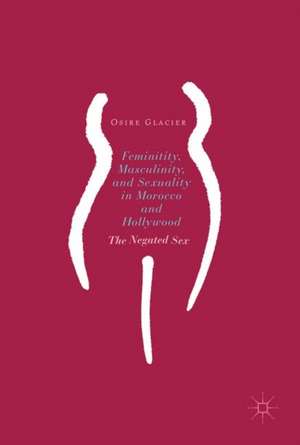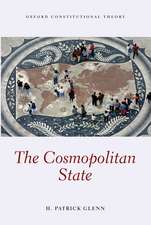Femininity, Masculinity, and Sexuality in Morocco and Hollywood: The Negated Sex
Autor Osire Glacieren Limba Engleză Hardback – 30 mai 2017
This book is the first to formulate an ideology of emancipation for women in Morocco. Beginning with constructs of the body, femininity and masculinity, it analyzes the central role played by the sociopolitical writing of sexuality in creating gender hierarchy. The author focuses on Morocco, while drawing parallels with Hollywood cinema, one of the great producers of femininity and masculinity, and conducts an exhaustive examination of constructs of femininity and masculinity in language, social practices, cultural productions and legal texts. The objectives of this project are tripartite: it exposes the dynamics that devalue women’s humanity; it charts the schemas of their sexual, economic and sociopolitical exploitation; and it advances concrete solutions for re-establishing women’s human dignity.
| Toate formatele și edițiile | Preț | Express |
|---|---|---|
| Paperback (1) | 629.65 lei 6-8 săpt. | |
| Springer International Publishing – aug 2018 | 629.65 lei 6-8 săpt. | |
| Hardback (1) | 634.88 lei 6-8 săpt. | |
| Springer International Publishing – 30 mai 2017 | 634.88 lei 6-8 săpt. |
Preț: 634.88 lei
Preț vechi: 746.92 lei
-15% Nou
Puncte Express: 952
Preț estimativ în valută:
121.58€ • 124.07$ • 102.29£
121.58€ • 124.07$ • 102.29£
Carte tipărită la comandă
Livrare economică 25 februarie-11 martie
Preluare comenzi: 021 569.72.76
Specificații
ISBN-13: 9783319532844
ISBN-10: 3319532847
Pagini: 246
Ilustrații: IX, 193 p.
Dimensiuni: 148 x 210 x 13 mm
Greutate: 0.4 kg
Ediția:1st ed. 2017
Editura: Springer International Publishing
Colecția Palgrave Macmillan
Locul publicării:Cham, Switzerland
ISBN-10: 3319532847
Pagini: 246
Ilustrații: IX, 193 p.
Dimensiuni: 148 x 210 x 13 mm
Greutate: 0.4 kg
Ediția:1st ed. 2017
Editura: Springer International Publishing
Colecția Palgrave Macmillan
Locul publicării:Cham, Switzerland
Cuprins
Chapter 1: Introduction.- Chapter 2: A Negated Body.- Chapter 3: A Negated Intellect.- Chapter 4: A Negated Existence.- Chapter 5: Conclusion.
Notă biografică
Osire Glacier is a lecturer in the History Department and in the Department of Politics and International Studies at Bishop’s University, Canada. She is the author of Les Droits humains au Maroc entre discours et réalité; Des femmes politiques au Maroc d’hier à aujourd’hui; Universal Rights, Systemic Violations and Cultural Relativism in Morocco; and Political Women in Morocco, Then and Now; and the blog www.etudesmarocaines.com.
Textul de pe ultima copertă
This book is the first to formulate an ideology of emancipation for women in Morocco. Beginning with constructs of the body, femininity and masculinity, it analyzes the central role played by the sociopolitical writing of sexuality in creating gender hierarchy. The author focuses on Morocco, while drawing parallels with Hollywood cinema, one of the great producers of femininity and masculinity, and conducts an exhaustive examination of constructs of femininity and masculinity in language, social practices, cultural productions and legal texts. This multidisciplinary study exposes in an analytical manner the mechanisms that transform the biological bodies of persons born with a vagina into feminine bodies belonging to the collectivity; therefore, it deliberately excludes religion from its analysis. The objectives of this project are tripartite: it exposes the dynamics that devalue women’s humanity; it charts the schemas of their sexual, economic and sociopolitical exploitation; andit advances concrete solutions for re-establishing women’s human dignity.
Caracteristici
Formulates an ideology for women’s emancipation in Morocco Transcends the polarizing debate dividing Moroccan and Middle Eastern feminists regarding religious and universalist narratives Establishes parallels with Hollywood cinema, suggesting that women of all cultures share a common condition based on discourse about the body and sex Breaks the taboo associated with speaking publicly about sexuality that has stifled feminist discourse in Morocco Directly links patriarchy and authoritarianism, effectively arguing that the status of women in society is an indicator of democracy












